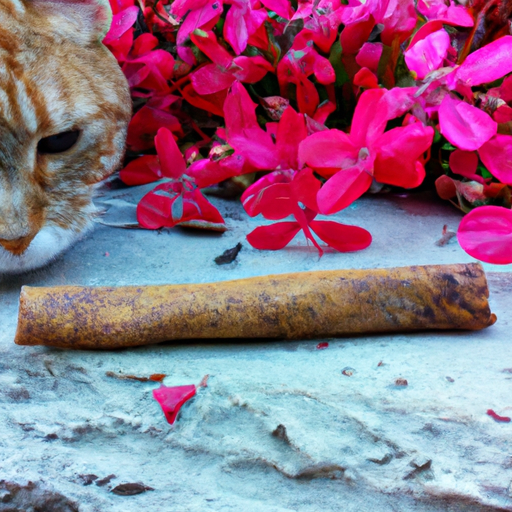Imagine this scenario: you have spent hours working on a beautiful flower bed in your backyard, only to wake up the next morning to find it completely destroyed by your mischievous feline friend. Frustration sets in as you wonder how to protect your garden from the relentless curiosity of your furry companion. But fear not, for there may be a simple solution within the aromatic wonders of cinnamon. In this article, we will explore the intriguing question: does cinnamon keep cats away?
The Use of Cinnamon as a Cat Repellent

Introduction to Cinnamon as a Cat Repellent
If you’re a cat owner, you may have experienced the frustration of dealing with your furry friend’s unwanted behavior and intrusion in certain areas of your home or garden. In your quest to find a natural and effective way to deter cats, you may have come across claims that cinnamon can be used as a cat repellent. In this article, we will explore the potential of cinnamon as a cat repellent, discussing the effect cinnamon has on cats, scientific research on its effectiveness, safety considerations, and alternative options.
How Does Cinnamon Affect Cats?
To understand how cinnamon works as a cat repellent, we need to delve into a cat’s sense of smell. Cats have an incredibly developed sense of smell, which plays a crucial role in their daily lives. They use their olfactory system to navigate their environment, communicate with other cats, detect threats, and find food. Certain smells can elicit behavioral responses in cats, including avoidance or attraction.
Research on Cinnamon as a Cat Repellent
Scientific research specifically targeting cinnamon as a cat repellent is limited. However, anecdotal evidence and personal experiences shared by cat owners suggest that cats may have an aversion to the smell of cinnamon. These reports have led some individuals to use cinnamon as a deterrent to keep cats away from specific areas. While these accounts provide insight into potential effectiveness, it is essential to approach them with caution, considering the individual variability in cats’ reactions to smells.
The Sense of Smell in Cats
Overview of a Cat’s Sense of Smell
A cat’s sense of smell is truly remarkable. Their ability to detect scents is estimated to be around 14 times more powerful than that of humans. Cats possess a specialized organ called the vomeronasal organ (VNO) located in the roof of their mouths, which is responsible for detecting pheromones and other scent molecules. This heightened sense of smell allows cats to perceive a broad range of odors and can influence their behavior.
Why Cats are Sensitive to Certain Odors
Certain smells can trigger specific responses in cats due to their biological and evolutionary history. Cats have evolved to be highly sensitive to odors that may indicate potential danger, such as the scent of predators or toxic substances. This sensitivity helps ensure their survival in the wild. Understanding how cats perceive and react to different smells is vital when considering the use of cinnamon as a cat repellent.
How Cats Respond to Different Smells
Cats display varying responses to different smells based on their individual preferences and experiences. Some odors may attract cats, while others may repel them. While there is no one-size-fits-all approach when it comes to scent-based deterrents, there are certain properties of cinnamon that may make it unpleasant for some cats.
The Properties of Cinnamon
Chemical Composition of Cinnamon
Cinnamon, derived from the bark of trees belonging to the Cinnamomum genus, contains various chemical compounds, including cinnamaldehyde, eugenol, and cinnamic acid. It is the combination of these compounds that gives cinnamon its distinct aroma and potential repellent properties.
Aroma and Fragrance of Cinnamon
The strong, spicy, and sweet aroma of cinnamon is enjoyed by many humans but may be overpowering for cats. Cats have a more sensitive olfactory system than humans, and scents that are pleasant to us may be overwhelming or irritating for them. The potent aroma of cinnamon may contribute to its potential effectiveness as a cat repellent.
Potential Repellent Properties in Cinnamon
While scientific studies specifically investigating the repellent properties of cinnamon in cats are limited, some individuals have reported success in deterring cats by using cinnamon. It is believed that certain compounds found in cinnamon, such as cinnamaldehyde, may be unpleasant to cats and discourage them from entering or marking certain areas. However, it is important to note that cats’ responses can vary significantly, and what may work for one cat may not work for another.
Cats and Cinnamon: Anecdotal Evidence
General Reactions of Cats to Cinnamon
Anecdotal evidence suggests that cats generally have a negative reaction to the smell of cinnamon. Some cats may avoid areas where cinnamon is applied or displayed, possibly due to the strong aroma. However, it is important to remember that cats’ responses can be highly individual, and there is no guarantee that all cats will find cinnamon repellent.
Experiences Shared by Cat Owners
Many cat owners have shared their experiences using cinnamon as a cat repellent. Some have reported that sprinkling cinnamon around their gardens or spraying cinnamon-infused solutions on furniture or surfaces has helped deter cats from these areas. These accounts provide valuable insights into the potential effectiveness of cinnamon as a cat repellent, but individual experiences may vary.
Variability among Individual Cats
It is crucial to acknowledge that each cat is unique, and their responses to scents, including cinnamon, can differ. Some cats may be unbothered by the scent of cinnamon, while others may find it highly aversive. When considering the use of cinnamon as a cat repellent, it is important to closely monitor your cat’s behavior and adjust your approach accordingly.
Scientific Studies on Cinnamon and Cats
Overview of Existing Research
Scientific studies specifically examining the effects of cinnamon on cat behavior are limited. Most studies focus on cats’ olfactory capabilities and responses to certain scents without specifically targeting cinnamon. This lack of direct research limits our understanding of the effectiveness and reliability of cinnamon as a cat repellent.
Effects of Cinnamon on Cat Behavior
While there is a scarcity of scientific studies on cinnamon as a cat repellent, researchers have explored the influence of other scents on cat behavior. These studies suggest that certain odorants, such as citrus, lavender, or vinegar, may have deterrent effects on cats. Although cinnamon has not been extensively studied, it is possible that it may elicit similar responses in cats due to its strong aroma.
Limitations and Contradictions in Studies
When interpreting scientific studies on cat behavior and scent perception, it is essential to consider the limitations and contradictions within the research. Cats’ responses to scents can vary significantly, making it challenging to draw definitive conclusions. Additionally, the lack of specific studies on cinnamon as a cat repellent leaves unanswered questions regarding its reliability and effectiveness.
Safety Considerations for Using Cinnamon
Potential Health Risks for Cats
While cinnamon is generally considered safe for human consumption, it is important to exercise caution when using it around cats. Cats have different physiological responses to certain substances, and some may be more sensitive than others. Ingesting or inhaling excessive amounts of cinnamon may cause gastrointestinal upset, respiratory irritation, or allergic reactions in cats. It is advisable to consult with a veterinarian before using cinnamon as a cat repellent, especially if your cat has any underlying health conditions or sensitivities.
Appropriate Application Methods
When using cinnamon as a cat repellent, it is crucial to consider the appropriate application methods. Sprinkling cinnamon powder or using cinnamon-infused sprays may be effective in deterring cats from specific areas. However, it is important to avoid direct contact with your cat’s fur or skin. Cats may groom themselves, and consuming cinnamon directly may pose health risks.
Consulting a Veterinarian
To ensure the safety and well-being of your cat, it is always advisable to consult with a veterinarian before using any natural remedies or repellents. A veterinarian can provide guidance specific to your cat’s health, behavior, and individual needs, offering alternative options or additional precautions based on their expertise.
Alternatives to Cinnamon for Cat Repellent
Other Natural Remedies
While cinnamon may have shown some potential as a cat repellent, there are numerous other natural remedies worth exploring. Citrus peels, vinegar, lavender oil, and citrus-scented sprays have been reported to deter cats due to their strong odors. Experimenting with different natural remedies may help you find the most effective solution for your particular situation.
Physical Barriers and Deterrents
In addition to scent-based repellents, physical barriers and deterrents can be effective strategies for keeping cats away from certain areas. Installing fence extensions, using motion-activated sprinklers or ultrasonic devices, or placing rocks or thorny plants in gardens are examples of physical deterrents that can discourage cats from entering restricted areas.
Professional Cat Repellents
If natural remedies and physical deterrents have not yielded the desired results, there are professional cat repellents available on the market. These repellents often contain odorants or ultrasonic signals that are specifically designed to deter cats. Consult with a professional or explore reputable cat repellent products to find one that suits your needs.
Tips for Deterring Cats
Maintaining a Clean Environment
Cats are less likely to be attracted to spaces that are clean and devoid of potential food sources or hiding places. Regularly cleaning up food spills, properly storing garbage, and removing clutter can help discourage cats from entering your space.
Creating Distraction and Obstacles
Providing alternative and more appealing options for cats can divert their attention from unwanted areas. Setting up scratching posts, providing interactive toys, or creating comfortable resting places can encourage cats to focus their energy elsewhere.
Using Noise and Motion to Scare Cats Away
Cats can be sensitive to sudden, loud noises or surprising movements. Utilizing tools such as wind chimes, motion-activated sensors, or even strategically placed pots or pans can startle cats and create a negative association with the targeted area.

Cat Repellents for Specific Areas
Keeping Cats Out of Gardens
Gardens can be a tempting playground for cats, potentially leading to damage to plants or unwanted digging. Various deterrents can be employed to keep cats out of gardens, such as sprinkling citrus peels, using vinegar-soaked rags, or installing motion-activated sprinklers.
Deterrence for Indoor Spaces
To keep cats away from specific indoor spaces, consider using scent-based deterrents like lavender oil or commercially available cat repellent sprays. It may also be helpful to create physical barriers, such as closing doors or using baby gates, to restrict access to certain areas.
Cat Repellents for Outdoor Areas
If you have outdoor areas that you want to keep cat-free, physical barriers like fences or netting can be effective solutions. Additionally, strategically placed motion-activated deterrents or sprays that emit unpleasant scents can help deter cats from entering these spaces.
Conclusion
Summary of Findings
While cinnamon has been touted as a potential cat repellent, the scientific research specifically targeting cinnamon as a deterrent is lacking. Anecdotal evidence and personal experiences shared by cat owners suggest that cats may have an aversion to the smell of cinnamon, making it a possible option for cat repellent purposes. However, cats’ responses to scents can vary significantly, and not all cats may find cinnamon unpleasant or deterring.
Personal Experiments and Experience
Due to the limited research on cinnamon as a cat repellent, it may be necessary to conduct personal experiments to determine its effectiveness for your specific cat or situation. Observe your cat’s behavior closely when cinnamon is present to gauge their reaction, and adjust your approach accordingly.
Choosing the Right Cat Repellent
When it comes to selecting a cat repellent, it is essential to consider the individual cat’s preferences and needs. Consult with a veterinarian, try different natural remedies, explore physical barriers, or consider professional cat repellents to find the most effective solution for deterring cats from unwanted areas. The key is to find a method that respects your cat’s welfare while keeping your home or garden cat-free.




